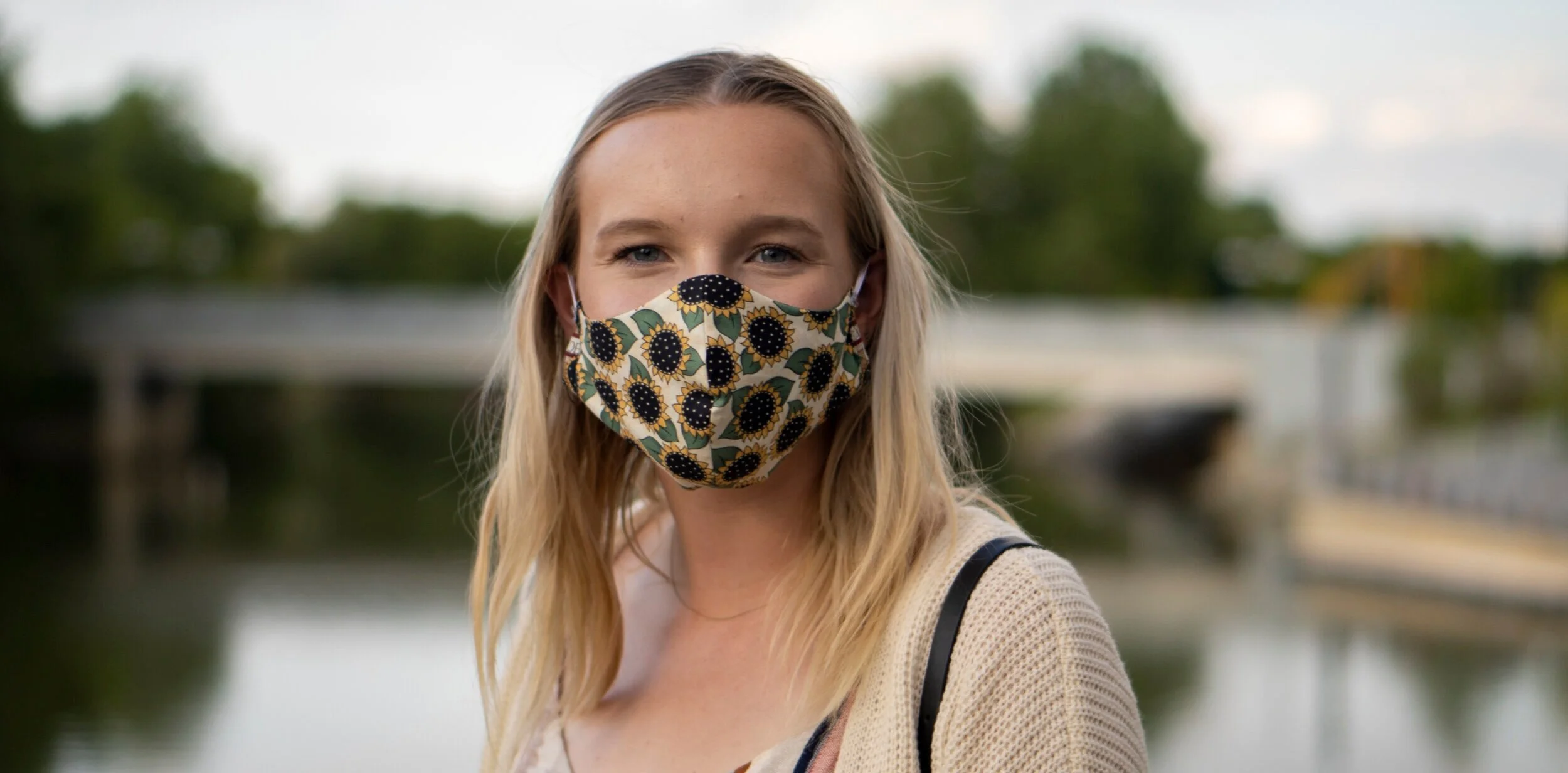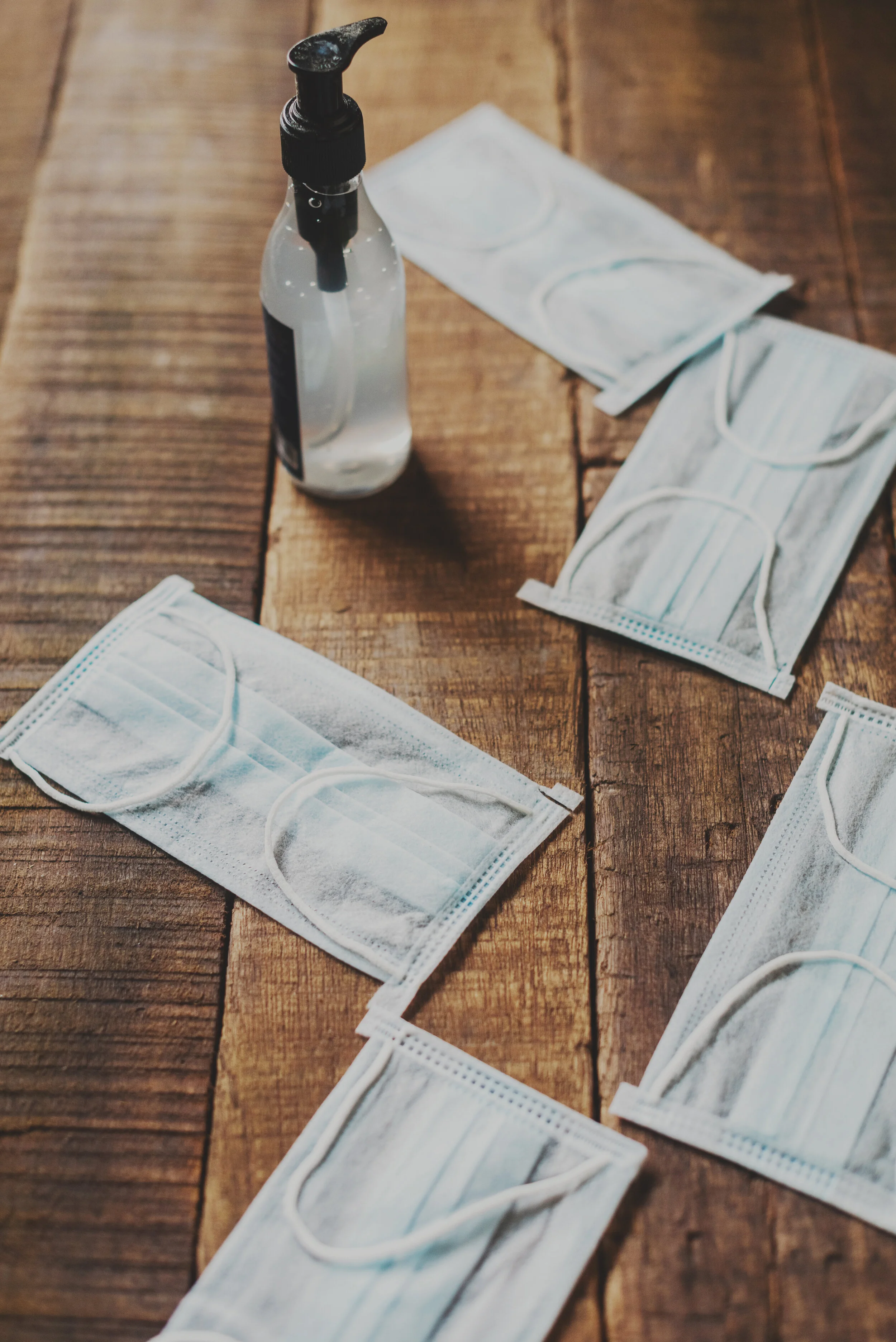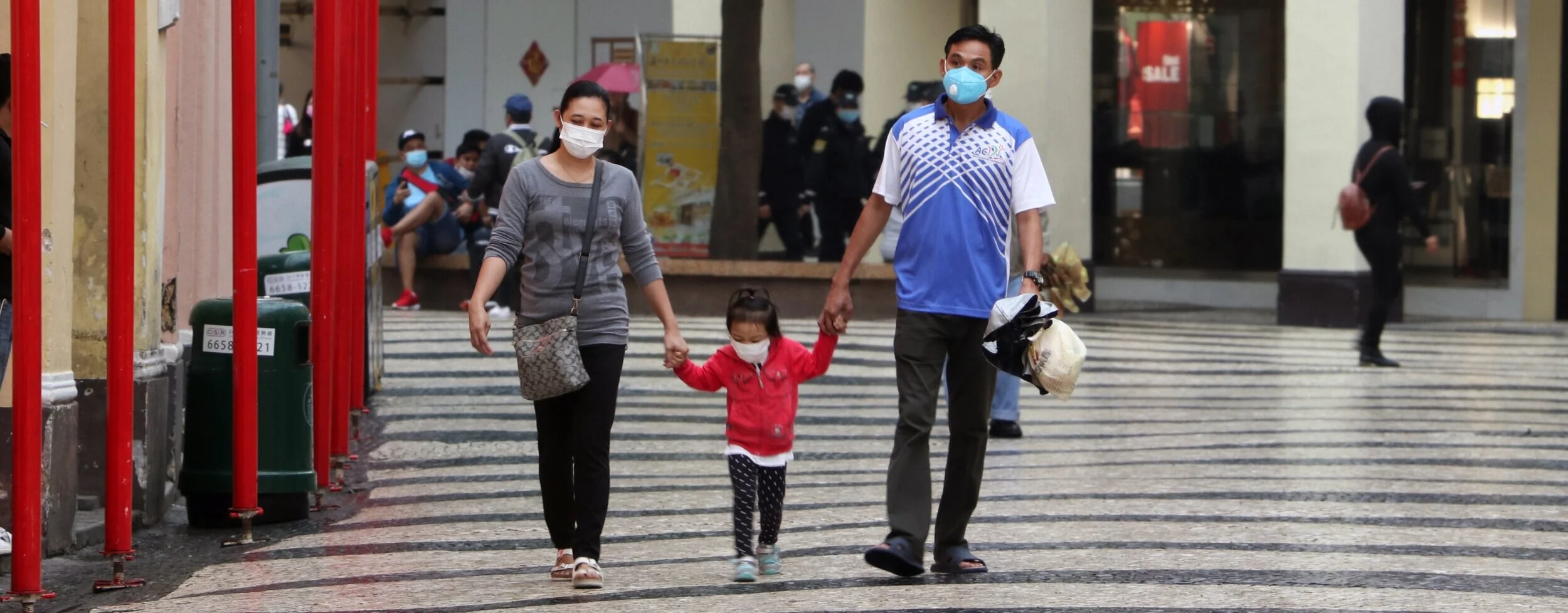TO WEAR A MASK OR NOT TO WEAR A MASK?
THE CONTROVERSY OF MANDATED FACE COVERINGS
Key Facts
As of August 20, 2020, the United States has passed 5.5 million cases of coronavirus with over 172,000 deaths. [1]
A recent Gallup poll showed that 86% of Americans “always” or “usually” wear a mask indoors, while only 47% indicated they wear the mask outdoors. A further division can be seen based on political party. 97% of Democrats and 70% of Republicans say they wear a mask indoors, while 64% of Democrats and 23% of Republicans wear a mask outdoors. [2]
While the Center for Disease Control (CDC) and World Health Organization (WHO) initially advised against wearing masks earlier in the year, both organizations reversed their positions upon further review of the evidence. [3, 4, 5]
Similarly, after months of mixed messages, President Trump has also recently urged Americans to wear masks, stating, “My administration has a different approach: We have urged Americans to wear masks. And I emphasized this is a patriotic thing to do. Maybe they’re great and maybe they’re just good. Maybe they’re not so good. But frankly, what do you have to lose? You have nothing to lose.” [6]
Key Scriptures
Ephesians 4:15 “Rather, speaking the truth in love, we are to grow up in every way into him who is the head, into Christ.”
Romans 13:1-2 “Let every person be subject to the governing authorities. For there is no authority except from God, and those that exist have been instituted by God. Therefore whoever resists the authorities resists what God has appointed, and those who resist will incur judgment.”
Romans 14:10-13 “Why do you pass judgment on your brother? Or you, why do you despise your brother? For we will all stand before the judgment seat of God; for it is written, "As I live, says the Lord, every knee shall bow to me, and every tongue shall confess to God." So then each of us will give an account of himself to God. Therefore let us not pass judgment on one another any longer, but rather decide never to put a stumbling block or hindrance in the way of a brother.”
1 Corinthians 10:23-24 “‘All things are lawful,’ but not all things are helpful. ‘All things are lawful,’ but not all things build up. Let no one seek his own good, but the good of his neighbor.”
Philippians 2:3-4 “Do nothing from selfish ambition or conceit, but in humility count others more significant than yourselves. Let each of you look not only to his own interests, but also to the interests of others.”
2 Timothy 1:7 “For God gave us a spirit not of fear but of power and love and self-control.”
Want to Know More?
The Gospel Coalition - 4 Reasons to Wear a Mask, Even if You Hate It
NPR - The Battle Between The Masked And The Masked-Nots Unveils Political Rifts
The Epoch Times - The Great Mask Debate
Centers for Disease Control and Prevention - About Masks
Centers for Disease Control and Prevention - Considerations for Wearing Masks
Association of American Physicians and Surgeons - Mask Facts
Mayo Clinic - COVID-19: How much protection do face masks offer?
Science and Religion - Masking the Issue
Application
Wearing a face mask has become a source of great controversy and confusion in the United States. To some people, wearing or not wearing a mask has become more of a political statement than a health decision meant to reduce the spread of COVID-19. Videos have emerged showing people getting into heated arguments over wearing or not wearing a mask. In such a tense environment, how should Christians think about something as simple as wearing a face mask? [7]
Why So Much Confusion?
Part of the reason so much confusion exists around the topic of masks is because of conflicting information given by experts and government officials.
Initially, back in February and March, the Centers for Disease Control (CDC) and World Health Organization (WHO) did not recommend for the general public to wear masks. Masks were to be reserved for healthcare professionals or for those who might come into contact with someone who is sick. Even Dr. Anthoni Fauci, director of the National Institute of Allergy and Infectious Diseases and a key member of President Trump’s Coronavirus Task Force, publicly advised against wearing masks, even though he now supports it.
One reason the decision was made not to recommend masks for the general public at that time was due to the fear that such a recommendation would lead to mask shortages for healthcare workers. The other part concerned the uncertainty over the effectiveness of the mask in preventing the spread of the coronavirus. Several studies published earlier this year led to conflicting evidence over the effectiveness of masks. [8] However, as more data came in, more studies were done, and a better understanding of the coronavirus was gained, the majority of the evidence began to show that masks were effective in helping reduce the spread of coronavirus. Thus, the CDC in April and WHO in June reversed their positions and now support the general public wearing masks.
Another reason so much confusion exists is due to a misunderstanding of what the different types of masks are meant and not meant to do.
First, let’s discuss the different types of masks. There are 3 types of masks used by most people: surgical masks, N95 respirators, and cloth masks. Most people use the common surgical masks or cloth masks. According to the Food and Drug Administration (FDA), “A surgical mask is a loose-fitting, disposable device that creates a physical barrier between the mouth and nose of the wearer and potential contaminants in the immediate environment,” whereas an N95 respirator, “is a respiratory protective device designed to achieve a very close facial fit and very efficient filtration of airborne particles.” Because the N95 mask offers better protection against incoming airborne particles to the mask wearer, it is often referred to as Personal Protective Equipment (PPE). The CDC recommends that the general public wear the common surgical masks or cloth masks so that PPE like the N95 respirator masks can still be reserved for healthcare workers and other medical first responders, who require greater protection for themselves and their patients. People should also avoid masks with exhalation vents as well as neck gaiters. Recent evidence has emerged saying that neck gaiters do not effectively stop the spread of Covid-19 and could potentially make it worse.
Surgical masks and cloth masks offer little protection against incoming airborne particles, but can be helpful in preventing the mask-wearer from spreading the disease to others. As stated by the CDC, “A mask may not protect the wearer, but it may keep the wearer from spreading the virus to others.” This is due to the way the virus is spread coming out of our mouth in respiratory droplets. When you exhale, speak, sing, sneeze, or cough, you release respiratory droplets composed mostly of water and saliva. This is why you can fog up a mirror by breathing on it. Normally, these droplets are harmless. However, if someone is sick, these droplets can become carriers for viruses. Larger respiratory droplets will usually fall to the ground while smaller droplets tend to remain in the air. Surgical masks and cloth masks help provide a physical barrier to block the larger droplets as well as help reduce the number of smaller droplets released into your immediate environment
The technical nature of this discussion has also led to confusion over the word “protection.” Some get confused that since the masks offer very little protection against contracting the virus from the outside, then they aren’t effective at stopping the spread of coronavirus. However, this misunderstands the intention of the mask, which is to stop the person wearing the mask from spreading it to others, particularly those who are asymptomatic and don’t show any signs of being sick.
Don’t Masks Carry Risks?
Another source of contention around masks has been whether they carry risks to the user. If the risks were to outweigh the potential benefits, then this should certainly result in the rejection of masks. However, this does not appear to be the case from the available evidence.
One of the most common risks cited by opponents of wearing masks is about the levels of oxygen and carbon dioxide we inhale. Won’t wearing a mask decrease the amount of oxygen and increase the amount of carbon dioxide and lead to conditions like hypoxia (deprivation of oxygen to the body) or hypercapnia (excessive CO2 in the bloodstream)? Part of the answer will depend on the type of mask you are wearing. With surgical masks, while O2 and CO2 levels might change to some extent over time, it is insignificant enough that most experts say serious side-effects wouldn’t occur. The CDC and others also say this is unlikely, given that cloth masks and surgical masks are not airtight. On the other hand, even if the O2 and CO2 levels aren’t changed to a significant degree, masks do make breathing more difficult. Caution should be used with strenuous activities such as exercising as it can elevate your heart rate. With N95 masks, since it is more airtight, it is possible that someone could develop a headache or dizziness from the increased CO2 levels if worn for longer than 1 hour at a time, but it is still unlikely this could lead to more serious symptoms. Since all masks can make breathing more difficult, the CDC recommends that masks should not be worn by children under 2, those with respiratory conditions who have difficulty breathing, or those who are incapacitated and can’t remove the mask themselves.
An additional concern stems from whether masks can spread the virus more by being uncomfortable, leading wearers to touch their face more often. While Dr. Anthony Fauci expressed concerns in March that this could be true, several studies since then show that wearing a mask actually reduces touching one’s face. The Mayo Clinic recommends that if you do touch your mask, you should wash your hands.
Lastly, it is claimed that masks can lead to a bacterial infection or other sickness. Again, this is highly unlikely, if not impossible. Nothing about wearing a mask in and of itself could lead to this outcome. A bacterial infection could only occur as a result of the masks if one were to reuse them constantly without ever washing them or throwing them away. Reusing masks in this way could lead to a buildup of bacteria in the cloth. Proper mask usage is important. The surgical masks are meant to be used once and thrown away, and cloth masks should be washed regularly.
What Does the Bible Say?
The Bible doesn’t directly address the issue of wearing a face mask. As such, this is an issue where Christians can disagree in good conscience. Nevertheless, the Bible does give us general principles which can be applied to this situation.
First, we need to be focused on serving others and putting their needs before our own. Philippians 2:3-4 reminds us, “Do nothing from selfish ambition or conceit, but in humility count others more significant than yourselves. Let each of you look not only to his own interests, but also to the interests of others.” Based on the available evidence we have, does wearing a mask or not wearing a mask put the needs of our neighbor ahead of our own comforts and preferences?
Second, we need to submit to and honor the governing authorities as we are commanded in Romans 13:1-7 and 1 Peter 2:13-17. As it is explained in the article on Romans 13, this submission is not absolute but qualified first on obedience to God’s commands. Based on this, if the government is mandating the general public to wear a mask, then does wearing a mask or not wearing a mask best honor the governing authorities as God would have us?
Lastly, we need to be gracious and kind to one another, allowing for disagreement. Romans 14:12 reminds us that each person will have to give account of himself to God. On an issue in which we don’t have clear direction from Scripture, we should not despise the one who wears a mask, nor should we pass judgment on the one who doesn’t (Romans 14:3). We need to be able to speak the truth in love (Ephesians 4:15), not acting or reacting out of fear (2 Timothy 1:7) but with a sound mind that follows the best available evidence and good judgment.
Conclusion
Should Christians wear a mask? In matters of wisdom such as these, we have to look at both sides of the argument, weigh the risks and the rewards, and act accordingly. While there might be some exceptions, the available evidence that we have would seem to indicate that wearing a mask would be the most prudent decision to help slow the spread of the virus, love our neighbors well, and honor the governing authorities. If new evidence arises which is contrary to the current consensus, then such evidence should be taken seriously and properly evaluated. Of course, some Christians will disagree with this assessment, and that is okay. What ultimately matters is that our decisions are rooted in the desire to honor the Lord and love our neighbors, not act out of selfish intent.
[1] https://www.cdc.gov/covid-data-tracker/#cases
[2] https://news.gallup.com/poll/316928/face-mask-usage-relatively-uncommon-outdoor-settings.aspx
[5] https://www.cdc.gov/media/releases/2020/p0714-americans-to-wear-masks.html
[7] At the start, I want to say that I am not a health expert and that there are incredibly smart people on both sides of this debate. Much more study needs to continue to be done. Nevertheless, as I hope to demonstrate, the evidence over time seems to point more in one direction than another.
[8] Compare, for example: http://files.fast.ai/papers/masks_lit_review.pdf and https://www.nejm.org/doi/full/10.1056/NEJMp2006372?af=R&rss=currentIssue



